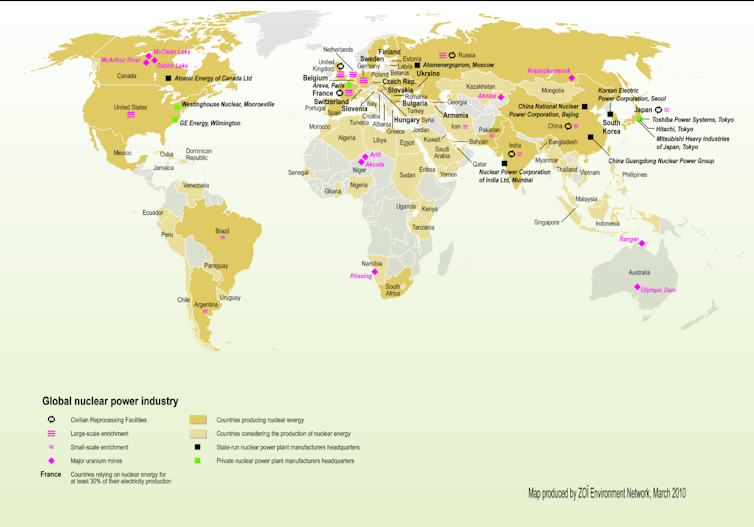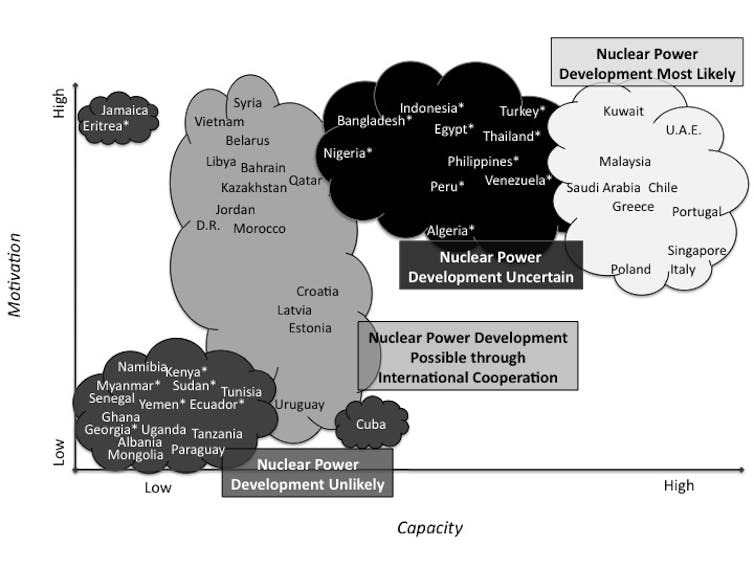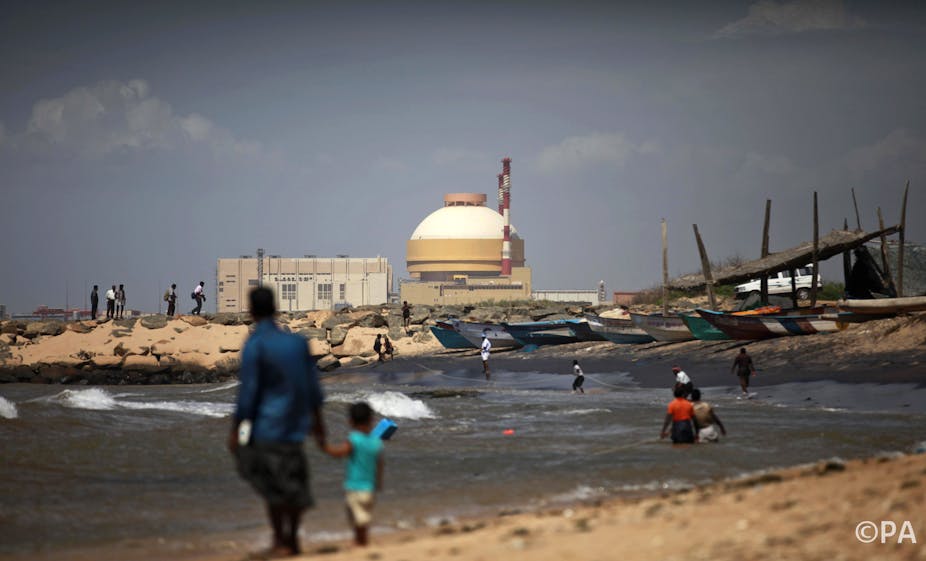UN inspectors descend on Iran this week to visit the Arak heavy water plant, and engineers at the wrecked Fukushima nuclear power plants in Japan attempt one of the most challenging nuclear salvage operations ever. But below the headlines is a potential expansion of nuclear energy not seen since the 1970s and 80s.
According to the International Atomic Energy Agency, the UN’s international nuclear watchdog, 29 countries are considering constructing their first nuclear power plant. There are doubts as to which of these nuclear “newcomer” countries can actually succeed and join the 31 countries that already operate nuclear reactors. One thing’s for sure: these countries will need to import the technology and most of the skilled manpower required from existing nuclear operators to get their programmes off the ground.
But newcomers to nuclear energy have found that this is a market with few suppliers. According to last year’s Global Energy Assessment, only 12 companies in just eight countries have the capacity to construct the pressure vessels which are central to the construction of a nuclear power plant. So, while nuclear power can shield countries from the price volatility of gas and coal – the main competitors to nuclear-generated electricity – those states wishing to deploy it must deal with an industry with the most concentrated supply chain of any of the major energy sources today.

Plenty of buyers, few suppliers
However, according to a study from 2011, very few newcomers have the capacity and motivation necessary to build a nuclear power plant. Of the 30 countries with operating nuclear power plants today, all were started before 1986, the year of the fateful Chernobyl accident. Historically, countries started nuclear power programs to increase electricity generation in response to rising demand. Most of these countries were rich and politically stable with economies big enough to absorb the necessary state investment.
But few countries match this profile – in fact a third of newcomer states rank among the 50 most unstable countries in the world such as Bangladesh, Nigeria and Egypt. There are only a few examples of nuclear power programmes that began during periods of political instability, and those went along with the pursuit of nuclear weapons (in Argentina, Brazil, India and Pakistan). This gives some indication of the degree of political commitment required to overcome investor anxiety in the face of an unpredictable political landscape.
Even with the limited choice of suppliers, newcomers have found willing partners eager to expand into new markets, as some existing markets decline following the disaster at Fukushima in 2011. The prime minister of Japan recently signed export agreements with Turkey and the UAE, and Russia has agreed to finance nuclear power plants in Turkey and Belarus. Nicolas Sarkozy, former French president and a famous proponent of expanding nuclear power into the developing world (it already provides more than two thirds of France’s electricity), went so far as to say the industry holds “the reputation and image of France in their hands”. Few other industries receive such high level financial and rhetorical support.

In Belarus and UAE, states in which construction has started on their first nuclear power plant, nuclear suppliers are playing a critical role. This is most pronounced in Belarus – a small country with a limited domestic electricity grid, it would not be able to afford such a project without Russian finance. Ironically, this is also the country where the benefits of nuclear power could be the lowest: the deal would diversify the nation’s energy supply from today’s reliance on gas from Russian state-owned gas firm Gazprom, only as far as adding nuclear power from Russian state-owned nuclear firm Rosatom.
The ‘wrong hands’
The spread of nuclear technology raises three main concerns: safety, physical security and proliferation. Safety means preventing accidental system and equipment failures. Physical security means guarding against nuclear materials or fissile material falling into the wrong hands. Proliferation involves the spread of nuclear weapons or other fissile material to new countries.
In terms of accidents, there is nothing intrinsically unsafe about more countries operating nuclear power plants. Nuclear newcomers should and presumably will be held to the same safety standards as existing nuclear operators. A new code of conduct for Nuclear Power Plant Exporters commits to adhering to international safety requirements. Some experts argue that after Fukushima, newcomers are that much more concerned about implementing the highest safety procedures.
A similar argument could be made in terms of physical security, but the instability of some states with nuclear ambitions causes concern, such as the Chinese deal to supply nuclear tech to Pakistan. The Convention on the Physical Protection of Nuclear Material is meant to combat the risk of nuclear power falling into the wrong hands. But of the three countries which have already signed a contract for their first nuclear power plant, only the UAE has ratified the Convention.
Perhaps the trickiest risk to counter is that of proliferation. Nuclear Power Plant Exporters provide nuclear power “exclusively for peaceful purposes”. Additionally, the nuclear supply chain companies typically restrict the sale of uranium enrichment or plutonium reprocessing equipment. For example, in the UAE’s nuclear deal with the US – hailed as a model – the UAE agreed to forgo domestic uranium enrichment, the part of the nuclear cycle most closely linked to proliferation. Conventional wisdom is that countries which pursue nuclear power are not more likely pursue nuclear weapons, however a recent study found that even civilian nuclear co-operation increases the risk of nuclear proliferation by spreading material, equipment and know-how.
If even half of the national plans for nuclear power plants materialise, the geography of nuclear energy would radically change and could revitalise a stagnant industry. But given the obstacles to starting a national nuclear power programme even for rich and stable countries, it’s not likely to happen quickly elsewhere.

